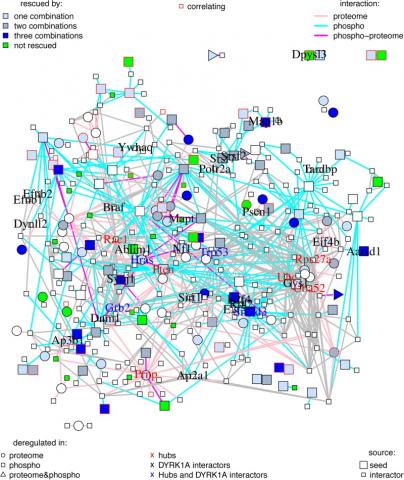DYRK1A Overexpression Alters Cognition and Neural-Related Proteomic Pathways in the Hippocampus That Are Rescued by Green Tea Extract and/or Environmental Enrichment

De Toma I, Ortega M, Aloy P, Sabidó E, Dierssen M, Down syndrome (DS), caused by trisomy of chromosome 21, is the most common genetic cause of intellectual disability. We recently discovered that green tea extracts containing epigallocatechin-3-gallate (EGCG) improve cognition in mice transgenic for Dyrk1a (TgDyrk1A) and in a trisomic DS mouse model (Ts65Dn). Interestingly, paired with cognitive stimulation, green tea has beneficial pro-cognitive effects in DS individuals. Dual Specificity Tyrosine-Phosphorylation-Regulated Kinase 1A (DYRK1A) is a major candidate to explain the cognitive phenotypes of DS, and inhibiting its activity is a promising pro-cognitive therapy. DYRK1A kinase activity can be normalized in the hippocampus of transgenic DYRK1A mice administering green tea extracts, but also submitting the animals to environmental enrichment (EE). However, many other mechanisms could also explain the pro-cognitive effects of green tea extracts and EE. To underpin the overall alterations arising upon DYRK1A overexpression and the molecular processes underneath the pro-cognitive effects, we used quantitative proteomics. We investigated the hippocampal (phospho)proteome in basal conditions and after treatment with a green tea extract containing EGCG and/or EE in TgDyrk1A and control mice. We found that Dyrk1A overexpression alters protein and phosphoprotein levels of key postsynaptic and plasticity-related pathways and that these alterations were rescued upon the cognitive enhancer treatments.
Frontiers in molecular Neuroscience,
2019
Pubmed: 31803016
Direct link: 10.3389/fnmol.2019.00272
